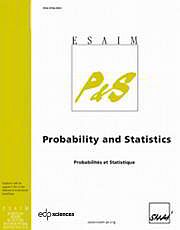Crossref Citations
This article has been cited by the following publications. This list is generated based on data provided by Crossref.
Schütte, Christof
and
Huisinga, Wilhelm
2003.
Special Volume, Computational Chemistry.
Vol. 10,
Issue. ,
p.
699.
Meerbach, E.
Dittmer, E.
Horenko, I.
and
Schütte, C.
2006.
Computer Simulations in Condensed Matter Systems: From Materials to Chemical Biology Volume 1.
Vol. 703,
Issue. ,
p.
495.
Diaconis, Persi
Khare, Kshitij
and
Saloff-Coste, Laurent
2008.
Rejoinder: Gibbs Sampling, Exponential Families and Orthogonal Polynomials.
Statistical Science,
Vol. 23,
Issue. 2,
Horenko, Illia
Dittmer, Evelyn
Lankas, Filip
Maddocks, John
Metzner, Philipp
and
Schütte, Christof
2008.
Macroscopic Dynamics of Complex Metastable Systems: Theory, Algorithms, and Application to B-DNA.
SIAM Journal on Applied Dynamical Systems,
Vol. 7,
Issue. 2,
p.
532.
Cattiaux, Patrick
and
Guillin, Arnaud
2008.
deviation bounds for additive functionals of markov processes.
ESAIM: Probability and Statistics,
Vol. 12,
Issue. ,
p.
12.
Wu, Liming
and
Yao, Nian
2008.
Large deviation principles for Markov processes via Phi-Sobolev inequalities.
Electronic Communications in Probability,
Vol. 13,
Issue. none,
Guillin, Arnaud
Léonard, Christian
Wu, Liming
and
Yao, Nian
2009.
Transportation-information inequalities for Markov processes.
Probability Theory and Related Fields,
Vol. 144,
Issue. 3-4,
p.
669.
Gao, Fuqing
and
Jiang, Hui
2009.
Deviation inequalities and moderate deviations for estimators of parameters in an Ornstein-Uhlenbeck process with linear drift.
Electronic Communications in Probability,
Vol. 14,
Issue. none,
Joulin, Aldéric
2009.
A new Poisson-type deviation inequality for Markov jump processes with positive Wasserstein curvature.
Bernoulli,
Vol. 15,
Issue. 2,
Löcherbach, Eva
Loukianova, Dasha
and
Loukianov, Oleg
2011.
Polynomial bounds in the Ergodic theorem for one-dimensional diffusions and integrability of hitting times.
Annales de l'Institut Henri Poincaré, Probabilités et Statistiques,
Vol. 47,
Issue. 2,
Komorowski, Tomasz
Landim, Claudio
and
Olla, Stefano
2012.
Fluctuations in Markov Processes.
Vol. 345,
Issue. ,
p.
33.
Ferré, Déborah
Hervé, Loïc
and
Ledoux, James
2012.
Limit theorems for stationary Markov processes with L2-spectral gap.
Annales de l'Institut Henri Poincaré, Probabilités et Statistiques,
Vol. 48,
Issue. 2,
Calegari, Danny
and
Walker, Alden
2013.
Random rigidity in the free group.
Geometry & Topology,
Vol. 17,
Issue. 3,
p.
1707.
Gao, F
Gao, F
Guillin, Arnaud
Guillin, Arnaud
Wu, L
and
Wu, L
2013.
Bernstein type’s concentration inequalities for symmetric Markov processes.
Теория вероятностей и ее применения,
Vol. 58,
Issue. 3,
p.
521.
Ichiba, Tomoyuki
Pal, Soumik
and
Shkolnikov, Mykhaylo
2013.
Convergence rates for rank-based models with applications to portfolio theory.
Probability Theory and Related Fields,
Vol. 156,
Issue. 1-2,
p.
415.
Gao, F.
Guillin, A.
and
Wu, L.
2014.
Bernstein-type Concentration Inequalities for Symmetric Markov Processes.
Theory of Probability & Its Applications,
Vol. 58,
Issue. 3,
p.
358.
Paulin, Daniel
2015.
Concentration inequalities for Markov chains by Marton couplings and spectral methods.
Electronic Journal of Probability,
Vol. 20,
Issue. none,
Strauch, Claudia
2016.
Exact adaptive pointwise drift estimation for multidimensional ergodic diffusions.
Probability Theory and Related Fields,
Vol. 164,
Issue. 1-2,
p.
361.
Gao, Fuqing
2017.
Long time asymptotics of unbounded additive functionals of Markov processes.
Electronic Journal of Probability,
Vol. 22,
Issue. none,
Strauch, Claudia
2018.
Adaptive invariant density estimation for ergodic diffusions over anisotropic classes.
The Annals of Statistics,
Vol. 46,
Issue. 6B,


